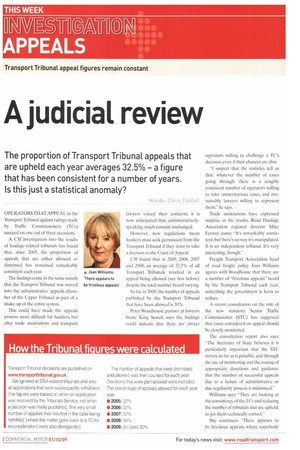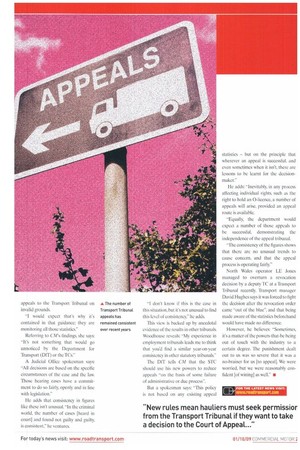A judicial review
Page 22

Page 23

If you've noticed an error in this article please click here to report it so we can fix it.
The proportion of Transport Tribunal appeals that are upheld each year averages 32.5% a figure that has been consistent for a number of years. Is this just a statistical anomaly?
Words; Chrls
OPERATORS THAT APPEAL to the Transport Ribunal against rulings made by Traffic Commissioners (TCs) succeed on one out of three occasions.
A CM investigation into the results of haulage-related tribunals has found that, since 2005, the proportion of appeals that are either allowed or dismissed has remained remarkably consistent each year.
The findings come in the same month that the Transport Tribunal was moved into the administrative appeals chamber of the Upper Tribunal as part of a shake-up of the entire system.
This could have made the appeals process more difficult for hauliers, hut after trade associations and transport lawyers voiced their concerns, it is now anticipated that, administrativelyspeaking, much remains unchanged.
However, new regulations mean hauliers must seek permission from the Transport Tribunal if they want to take a decision to the Court of Appeal.
CM found that in 2005, 2006, 2007 and 2008, an average of 32.5% of all Transport Tribunals resulted in an appeal being allowed (see box below), despite the total number heard varying.
So far, in 2009, the number of appeals published by the Transport Tribunal that have been allowed is 30%.
Peter Woodhouse, partner at lawyers Stone King Sewell, says the findings could indicate that there are always
operators willing to challenge a TC's decision, even if their chances are slim.
"I suspect that the statistics tell us that. whatever the number of cases going through. there is a roughly consistent number of operators willing to take unmeritorious cases, and presumably lawyers willing to represent them," he says.
Trade associations have expressed surprise at the results. Road Haulage Association regional director Mike Farmer states: "It's remarkably consistent, but there's no way it's manipulated. It is an independent tribunal. It's very interesting, though."
Freight Transport Association head of road freight policy Joan Williams agrees with Woodhouse that there are a number of "frivolous appeals" heard by the Transport Tribunal each year, something the government is keen to reduce.
A recent consultation on the role of the new statutory Senior Traffic Commissioner (STC) has suggested that cases considered on appeal should be closely monitored.
The consultation report also says: -The Secretary of State believes it is particularly important that the STC strives, so far as is possible, and through the use of monitoring and the issuing of appropriate directions and guidance, that the number of successful appeals due to a failure of administrative or due regulatory process is minimised."
Williams says: "They are looking at the consistency of the TCs and reducing the number of tribunals that are upheld, to get them technically correct."
She continues: "There appears to be frivolous appeals, where somebody
appeals to the Ti-ansport Tribunal on invalid grounds.
"I would expect that's why it's contained in that guidance; they are monitoring all those statistics."
Referring to CM's findings, she says: "It's not something that would go unnoticed by the Department for Transport (DIT) or the TC.s," A Judicial Office spokesman says: "All decisions are based on the specific circumstances of the case and the law Those hearing cases have a commitment to do so fairly, openly and in line with legislation."
He adds that consistency in figures like these isn't unusual. "In the criminal world, the number of cases [heard in court] and found not guilty and guilty, is consistent," he ventures. "I don't know if this is the case in this situation, but it's not unusual to find this level of consistency," he adds.
This view is backed up by anecdotal evidence of the results in other tribunals. Woodhouse reveals: "My experience in employment tribunals leads me to think that you'd find a similar year-on-year consistency in other statutory tribunals."
The DIE tells CM that the STC should use his new powers to reduce appeals "on the basis of some failure of administrative or due process".
But a spokesman says: "This policy is not based on any existing appeal statistics — but on the principle that wherever an appeal is successful, and even sometimes when it isn't, there are lessons to be learnt for the decisionmaker," He adds: "Inevitably, in any process affecting individual rights, such as the right to hold an 0-licence, a number of appeals will arise, provided an appeal route is available.
"Equally, the department would expect a number of those appeals to be successful, demonstrating the independence of the appeal tribunal.
"The consistency of the figures shows that there are no unusual trends to cause concern, and that the appeal process is operating fairly."
North Wales operator LE Jones managed to overturn a revocation decision by a deputy IC at a Transport Tribunal recently. Transport manager David Hughes says it was forced to fight the decision after the revocation order came "out of the blue", and that being made aware of the statistics beforehand would have made no difference.
However, he believes: "Sometimes, it's a matter of the powers-that-be being out of touch with the industry to a certain degree. rlhe punishment dealt out to us was so severe that it was a no-brainer for us [to appeal]. We were worried, hut we were reasonably confident [of wining] as well." •












































































































































